Key Points
- The first key SEO metric to track includes the amount of content written/published and then indexed. You should then monitor the number of keywords, impressions, clicks, traffic value, conversion rate, domain authority, session duration, and overall health score.
- Tracking all these metrics is made simple with some great online tools. Use Google Analytics and Google Search Console for sites you have full CMS access. For other sites and your own, turn to 3rd party tools like Ahrefs and Semrush.
- Different key metrics need to be collected at different stages and will differ depending on the type of website. For example, an eCommerce site will track different metrics to a professional service provider.
Introduction
SEO metrics provide valuable insights into your website’s performance, allowing you to make data-driven decisions and optimise your strategies accordingly. Which metrics you focus on will vary depending on what stage of development the website is in.
When launching a new website, tracking metrics related to indexing, keyword rankings, and impressions should be your focus. As the website grows, conversion rates, average session duration, and domain authority start to become important.
There is then the point that the metrics that need to be monitored can vary based on the type of website. An eCommerce site will likely prioritise metrics related to sales conversions, while a professional service provider like an accountancy firm might focus on metrics related to lead generation.
Whatever your circumstance, tracking the metrics we list below will help you make informed decisions and strengthen your SEO game.
1. Pages Created and Published
To establish authority and win at SEO, thorough tracking of created and published pages is a must. Search engines are inherently driven by the objective of delivering users with relevant and valuable content. One factor they consider is the frequency of content being updated.
However, the significance of tracking pages extends beyond quantity – quality is equally crucial. Your goal should be to address search intent, the underlying motivation behind users seeking information, products, or services. By monitoring pages, you can evaluate the degree to which search intent is satisfied and optimise your content accordingly.
2. Indexed Pages
Understanding the central role indexing plays in the visibility and discoverability of web content is crucial to SEO success. When search engines crawl a website, they evaluate its relevance and value, subsequently adding it to their index. This index functions as a comprehensive database from which search engines draw results for user queries. Therefore, the number of indexed pages you have will directly influence the likelihood of your page appearing in search results.
Monitoring indexed pages via Google Search Console will allow you to identify issues that may be stopping your website content from being ranked. Whether it’s broken links, duplicate content, or technical glitches restricting the crawling process, staying informed will allow you to fix things quickly and ensure search engines can easily locate and display your content.
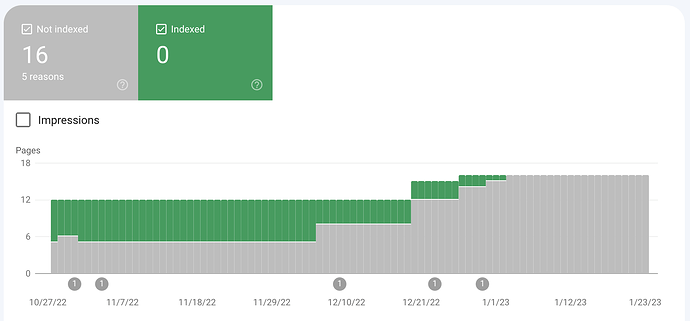
3. Keyword Ranking
By regularly checking your keyword rankings, you can gain valuable insights into how well your website is performing in search results. Keyword rankings directly reflect your website’s visibility on the SERP for relevant search queries. The more relevant keywords you have, the higher the chances of ranking well for them and being able to drive targeted traffic to your site.
Tools such as Google Search Console, Ahrefs, and Moz are invaluable for website owners, providing accurate data on keyword performance and highlighting areas for improvement. If you need some support with checking your website’s keyword ranking on Google, check out our guide here.
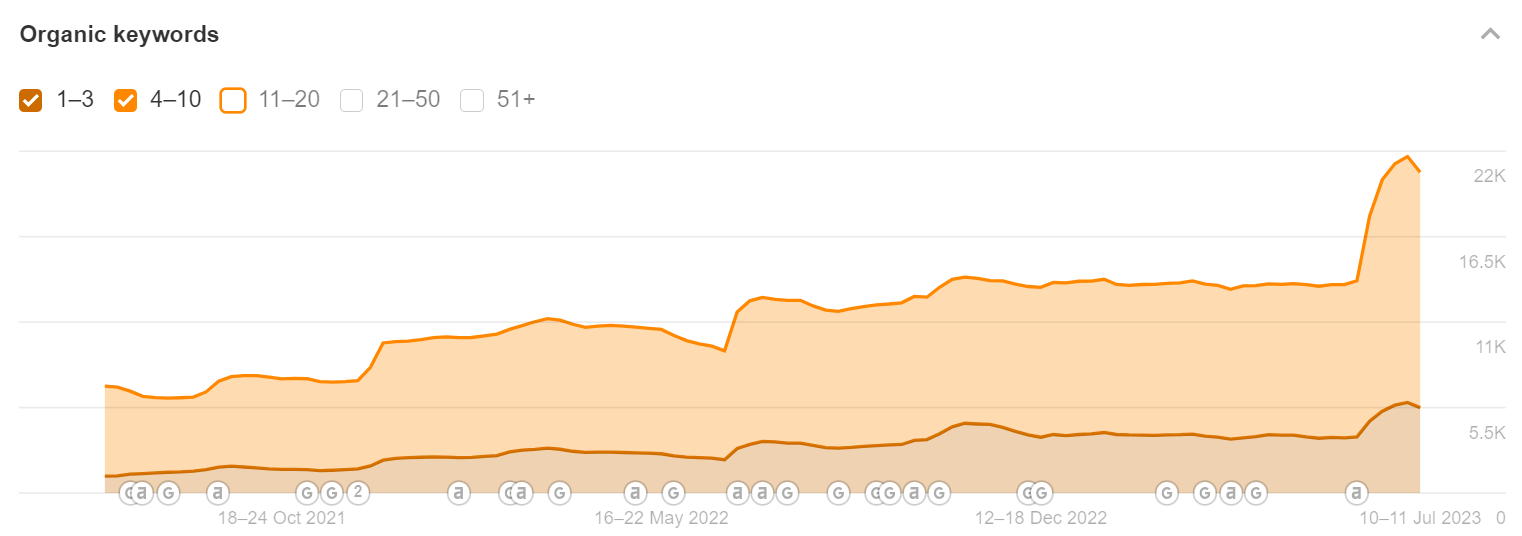
4. Impressions
Impressions refer to the number of times a webpage appears in the SERPs following users performing relevant searches. By monitoring your site’s impressions, you can identify which pages get the most visibility and how often they appear in the search result.
You can also identify patterns and trends by analysing impressions on Google Search Console over extended periods. This allows you to optimise your content strategy to align with user intent and search engine algorithms. But note that the impression metric differs from the number of clicks – it’s simply how often a page appears in the SERPs.
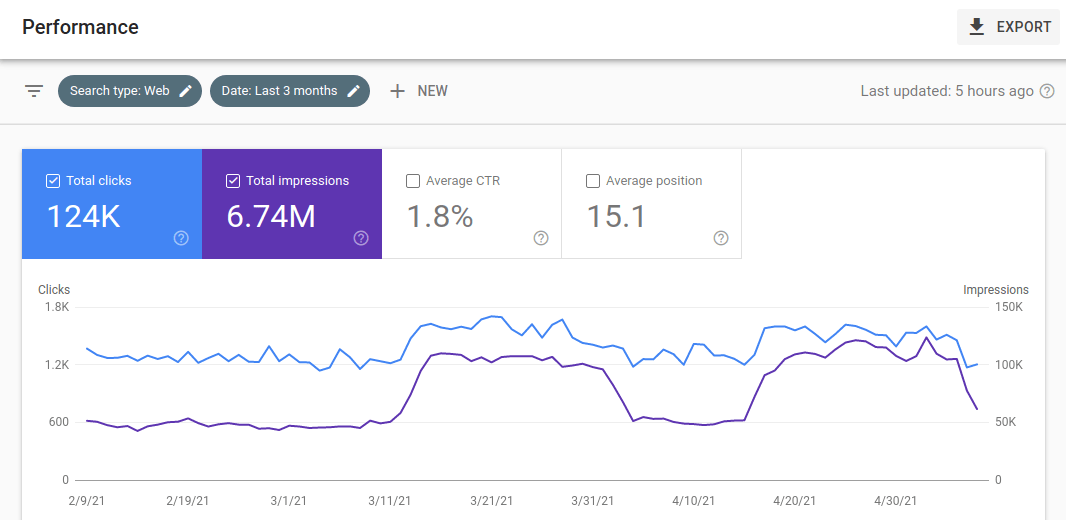
5. Clicks
One of the best bottom-funnel metrics to track is clicks. Monitoring your site’s clicks can help you determine the pages that are getting the most attention and provide helpful information about user engagement. For example, you can get insights into the effectiveness of your titles, meta descriptions, and featured snippets and identify pages that aren’t perming as you would like.
A couple of the best tools for click tracking include Google Search Console and SEMrush. Both platforms are simple to use and provide detailed reports to help you improve the number of clicks your pages get on Google.
6. Traffic Value
If you’re interested in monitoring the ROI from your SEO efforts, you’ll want to keep an eye on your organic traffic value. This metric gives you the paid equivalent of your organic traffic by keyword based on the traffic it generates on a monthly basis to your site. Essentially, it tells you the monetary worth of the organic traffic your website receives from search engines.
Various factors come into play when calculating traffic value. These include keyword rankings, click-through rates, conversion rates, and average transaction values. It can get a little complex, so it’s best to turn to tools like Ahrefs, which can calculate more accurately than if you attempted to estimate yourself.

7. Conversion Rate
Measuring your website’s conversion rate gives you a straightforward answer to whether your SEO efforts are actually paying off. Conversion occurs when visitors complete any desired action(s) on your website, such as making a purchase, reading your blog posts, or filling out a contact form. Basically, it refers to any activity that demonstrates a visitor’s interest in your products or services and willingness to buy them.
Whatever action it may be, you must track it to see what SEO strategies are working and what aren’t. This enables you to allocate your marketing efforts and budgets better based on what drives your audience to convert most.
8. Domain Rating/Authority
Domain rating, also known as domain authority, is a metric that foretells how likely a website is to appear on SERPs. Similar to a website’s health score, domain authority is also built on a logarithmic scale, ranging from 0 to 100. Apparently, domains with higher ratings have a higher probability of ranking better than those with lower scores.
Just to be clear, domain authority is not an official ranking factor of Google. However, it still makes sense to track this metric because it is calculated based on several important factors, including the number of backlinks, search traffic, and the quality of referring domains. These elements play an essential role in most search engine algorithms. Hence, working towards improving your website’s domain authority is imperative if you want to outrank your competitors and earn optimistic results.
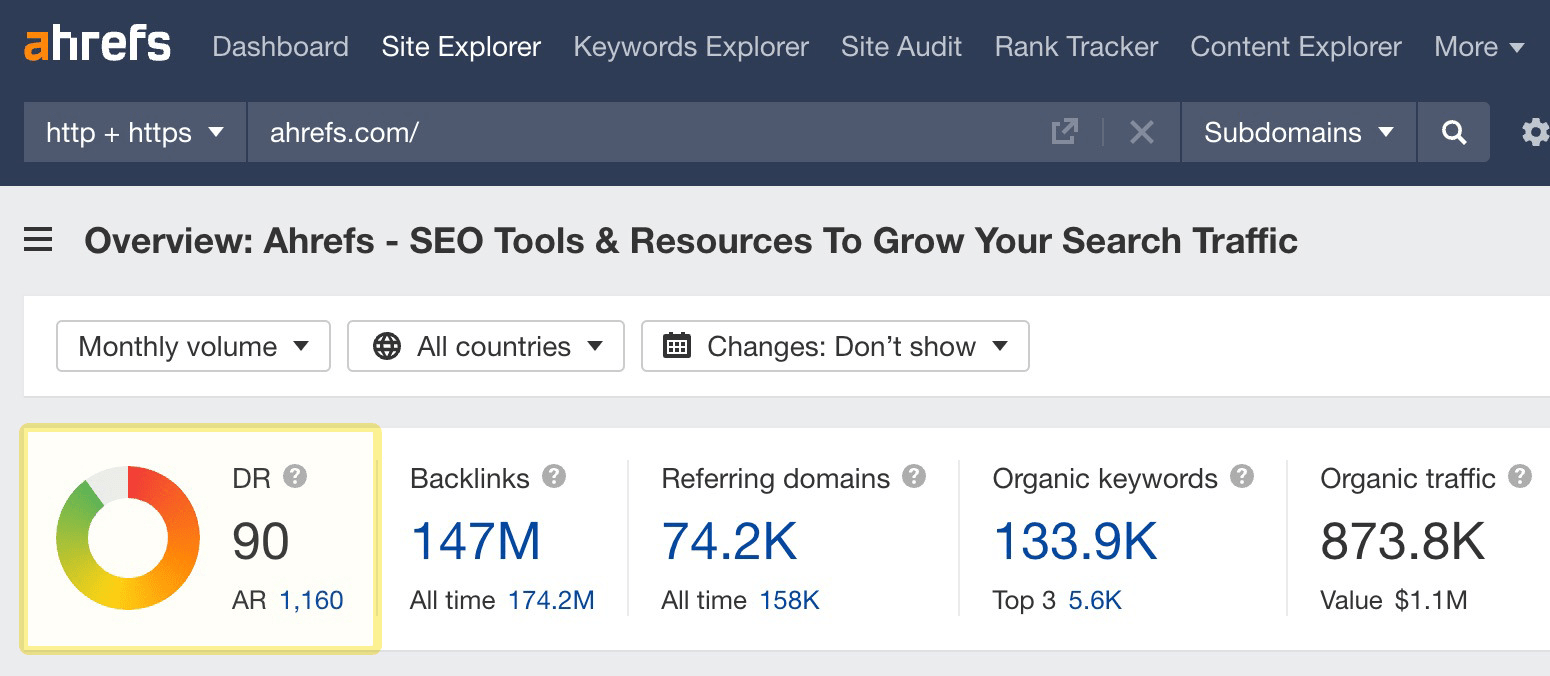
9. Average Session Duration
Average session duration refers to the amount of time a visitor spends navigating your website. Among all metrics we’ve discussed, this one gives you the most valuable insight into your power to drive visitors deeper into the conversion funnel. Generally speaking, a longer visit duration means that the user finds your content very compelling and wants to try out your products to solve their problems.
Acquiring more traffic is just the first step in driving sales and revenues. Your next move is to persuade visitors to complete a desired behaviour, such as making a purchase, filling out a form, or watching a video. Monitoring session duration is a must to help estimate how engaged your audience is with your website. If visitors are quickly exiting a page, something could be missing, and you need to fix it to give your audience a reason to stay.
10. Health Score
Take note that just because a website is beautifully designed does not mean it is healthy. Search engines are not ranking websites based on appearance alone. Aside from aesthetics, they also consider whether these websites are fully optimised and show relevance to specific search queries. Health scores are an essential SEO metric that determines the degree to which a website is optimised.
To calculate your health score, you need to measure the number of internal URLs or pages with errors on your website. Divide it by the total number of web pages you have, and multiply the answer by 100. Your website’s health score is presented as a percentage, indicating the ratio between pages with and without technical errors. This suggests that the higher a website’s health score, the better. Another way is to turn to an online tool like Ahrefs, which can give you a pretty accurate score.
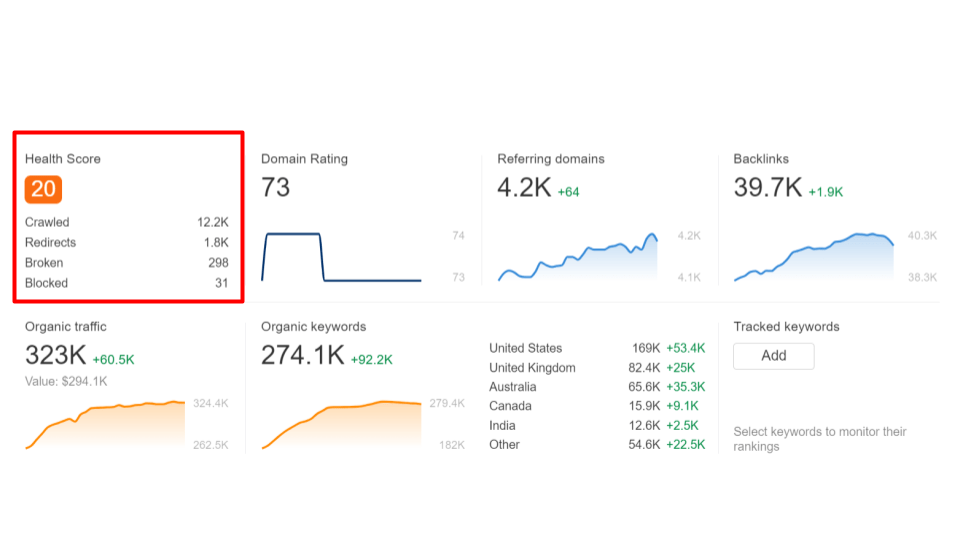
Final Thoughts
Metrics are absolutely valuable in measuring the success of any SEO campaign. While many are useful, not all SEO metrics will provide actionable data that enable you to make better decisions to reach your bottom line. It’s essential for business owners like yourselves to view these metrics as benchmarks that help point your marketing strategies in the right direction. When in doubt, book a discovery call with our SEO specialists, and we will discuss the best SEO strategy for you.



